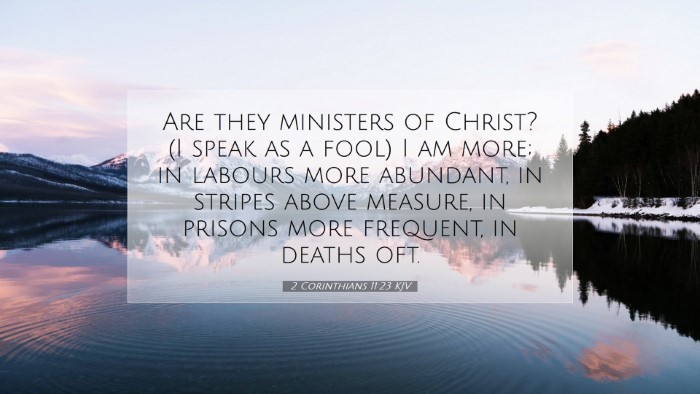Commentary on 2 Corinthians 11:23
In the epistolary literature of Paul, 2 Corinthians stands out for its profound emotional depth and theological richness. The verse 2 Corinthians 11:23 serves as a pivotal moment in Paul’s defense of his apostolic authority, contrasting his sufferings with the false apostles. Below is a synthesized examination of this verse, drawing insights from public domain commentaries by Matthew Henry, Albert Barnes, and Adam Clarke.
Verse Context and Meaning
2 Corinthians 11:23 reads: "Are they ministers of Christ? I speak as a fool; I am more; in labours more abundant, in stripes above measure, in prisons more frequent, in deaths oft." The Apostle Paul here enumerates his credentials, expressing the intensity of his sufferings as a testament to his genuine ministry.
Defending Apostolic Authority
The primary context of this verse occurs within Paul’s defense against the super-apostles — those who sought to undermine his authority by boasting of their qualifications. Paul’s rhetorical question, “Are they ministers of Christ?” indicates a challenge to these false leaders as he lays out the overwhelming evidence of his sacrificial service.
Labours More Abundant
Paul emphasizes that his labors are more abundant, which speaks not merely to the quantity but also to the quality of his ministry. Matthew Henry notes that Paul’s labor encompassed both physical toil and spiritual commitment, showing his dedication to preaching the gospel under severe conditions.
Stripes Above Measure and Prisons More Frequent
Here, Paul details the physical sufferings he endured. Albert Barnes elaborates that the “stripes” refer to the lashes or beatings received, a common occurrence for early Christians who boldly proclaimed their faith. Paul’s frequent imprisonments serve as a stark contrast to the comfort many false apostles enjoyed, reinforcing his authenticity.
In Deaths Oft
The phrase "in deaths oft" encapsulates the persistent danger to Paul’s life throughout his ministry. Adam Clarke comments on the numerous near-death experiences Paul faced due to persecution, stating that the Apostle did not merely face potential threats, but often encountered life-threatening situations.
Theological Implications
This verse invites deep theological reflection regarding the nature of apostolic suffering and the call to ministry. Paul’s list of afflictions raises crucial questions about the cost of discipleship and the true measures of success in ministry.
Cost of Discipleship
Paul’s sufferings remind us that true discipleship often involves trials and tribulation. Matthew Henry emphasizes that hardship is intrinsic in the Christian life, serving as a proving ground for one’s commitment to Christ.
Authenticity in Ministry
The contrast between Paul and the false apostles elucidates the criteria for authentic ministry. As Albert Barnes argues, faithfulness and genuine love for Christ and His people are essential, often evidenced by the sacrifices leaders are willing to make.
Encouragement for Suffering Servants
For modern pastors and ministry leaders, Paul’s experiences serve as both a warning and an encouragement. The trials they face may be overwhelming at times, yet understanding their role in God’s plan can provide deep solace. Adam Clarke reassures that God’s grace sustains those who endure for the sake of the gospel.
Conclusion
In conclusion, 2 Corinthians 11:23 encapsulates the heart of Paul’s ministry and serves as a call to understand the price of faithful service. For pastors, students, theologians, and Bible scholars, engaging with this verse in light of its context offers profound insights into the nature of true apostleship and commitment to Christ. Each detail of Paul’s suffering stands as a testament of authenticity, encouraging a deeper commitment to the calling of God, despite the adversities that may arise.


